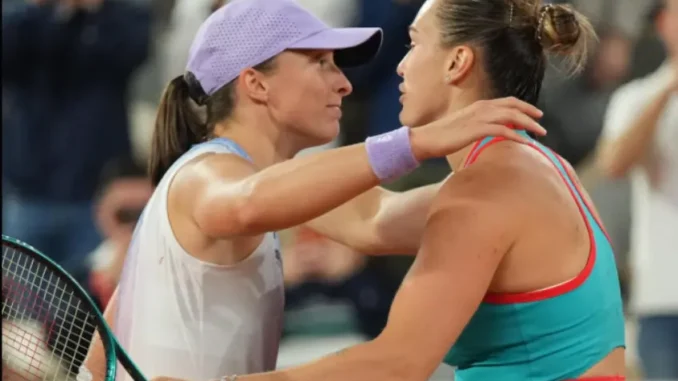
In a blockbuster semifinal at the 2025 French Open, Aryna Sabalenka, the world No. 1, delivered a commanding performance to defeat four-time champion Iga Swiatek 7-6(1), 4-6, 6-0, halting the Pole’s remarkable 26-match winning streak at Roland Garros. The victory propelled Sabalenka to her first French Open final, a milestone for the Belarusian, whose three previous Grand Slam titles came on hard courts. As she prepares to face Coco Gauff in the championship match, Sabalenka offered a gracious assessment of Swiatek’s level, praising her rival’s tenacity while reflecting on the high-stakes battle that showcased their era-defining rivalry on the clay of Court Philippe-Chatrier.
The match was a rollercoaster of momentum swings, with both players trading blows in a tense opening set. Sabalenka surged to a 4-1 lead, her powerful groundstrokes and aggressive returns overwhelming Swiatek’s serve, which yielded eight break points across the match. But Swiatek, known as the “Queen of Clay,” fought back, leveling the score at 4-4 by adjusting her return position to absorb Sabalenka’s pace. “Iga is the toughest opponent, especially on the clay, especially at Roland Garros,” Sabalenka said post-match, acknowledging the challenge of facing Swiatek on her favorite surface. The Belarusian dominated the first-set tiebreak 7-1, capitalizing on Swiatek’s 39% second-serve point win rate, but the Pole responded in the second set, showcasing her trademark spin and defensive prowess to level the match 6-4 with a delicate half-volley drop shot and a slicing forehand winner.
The third set, however, was a masterclass from Sabalenka, who rolled through in just 22 minutes, dropping only two points after breaking Swiatek’s serve at love. “It could not be more perfect than that,” Sabalenka said of her flawless 6-0 decider, crediting her rediscovered serve and composure under pressure. “I’m super proud right now. I’m glad I found my serve.” For Swiatek, the collapse was uncharacteristic, as she admitted, “I think I lost my intensity a bit, and she played as strong as in the first set, but I didn’t react to that well and just couldn’t push back.” Her 12 unforced errors in the third set, compared to Sabalenka’s zero, highlighted the Belarusian’s ability to seize control when it mattered most.
Sabalenka’s assessment of Swiatek’s performance was generous, recognizing the Pole’s high level despite her struggles in 2025, a year marked by no titles and a drop to No. 5 in the rankings. “I think she’s playing great tennis. Maybe she lost a bit of confidence… But overall I think today was a really high level match & today she played really great tennis,” Sabalenka said, reflecting on the quality of their 13th career meeting. The Belarusian, who has now reached six Grand Slam finals, emphasized the personal growth that has transformed her from a one-dimensional power player to a versatile competitor. Her improved drop shots and heavy topspin, once weaknesses on clay, were pivotal, though Swiatek’s speed neutralized some of these tactics. “I think over the years I evolved my game a lot, and I think I’m ready to play against powerful players,” Sabalenka noted, underscoring her readiness to tackle Swiatek’s relentless defense.
For Swiatek, the loss ended her bid to become the first woman in the Open Era to win four consecutive French Open titles, leaving her with a 40-3 record at Roland Garros, second only to Rafael Nadal in efficiency. Despite the defeat, she found positives in her campaign. “I love playing here, so for sure I’m happy I was fortunate enough to play so many great tournaments here,” she said, citing her thrilling comeback against Elena Rybakina in the fourth round as a highlight. Swiatek’s resilience shone through in that match, where she battled back from a 6-1, 2-0 deficit, but against Sabalenka, missed break point opportunities in the third set’s opening game proved costly. “She didn’t doubt. She just went for it,” Swiatek said of Sabalenka’s decisive play.
The match, played under a closed roof due to Paris’s wet weather, amplified Sabalenka’s power, with her forehand winners echoing through the stadium. Former world No. 9 Andrea Petkovic called it “the blockbuster of the entire tournament on the women’s side,” a sentiment echoed by fans disappointed by the early 11 a.m. scheduling. “It was a big match and probably would make more sense to put us a little bit later just so more people could watch it,” Sabalenka remarked, joining players like Swiatek and Gauff in questioning the tournament’s scheduling of women’s matches.
As Sabalenka prepares for the final, her victory over Swiatek, only her second on clay against the Pole in seven meetings, signals a shift in their rivalry. Swiatek, now looking to the grass season, remains optimistic: “I played some quality matches… I’m just happy that I have this place to come back to every year and just try to push myself.” For Sabalenka, the win is a career-defining moment, proving her clay-court credentials and setting the stage for a shot at her fourth major title.
Leave a Reply